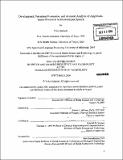| dc.contributor.advisor | Robert E. Hillman and Kenneth N. Stevens. | en_US |
| dc.contributor.author | Saikachi, Yoko | en_US |
| dc.contributor.other | Harvard University--MIT Division of Health Sciences and Technology. | en_US |
| dc.date.accessioned | 2010-04-28T17:17:25Z | |
| dc.date.available | 2010-04-28T17:17:25Z | |
| dc.date.issued | 2009 | en_US |
| dc.identifier.uri | http://hdl.handle.net/1721.1/54667 | |
| dc.description | Thesis (Ph. D.)--Harvard-MIT Division of Health Sciences and Technology, 2009. | en_US |
| dc.description | "September 2009." Cataloged from PDF version of thesis. | en_US |
| dc.description | Includes bibliographical references (p. 120-126). | en_US |
| dc.description.abstract | An Electrolarynx (EL) is a battery-powered device that produces a sound that can be used to acoustically excite the vocal tract as a substitute for laryngeal voice production. ELs provide laryngectomy patients with the basic capability to communicate, but current EL devices produce a mechanical speech quality which has been largely attributed to the lack of natural fundamental frequency (F0) variation. In order to improve the quality of EL speech, the present study aimed to develop and evaluate an automatic F0 control scheme, in which F0 was modulated based on variations in the root-mean-squared (RMS) amplitude of the EL speech signal. Recordings of declarative sentences produced by two male subjects before and after total laryngectomy were used to develop procedures for calculating F0 contours for EL speech, and perceptual experiments and acoustic analyses were conducted to examine the impact of F0 modulation on the quality and prosodic function of the EL speech. The results of perceptual experiments showed that modulating the F0 of EL speech using a linear relationship between amplitude and frequency made it significantly more natural sounding than EL speech with constant F0, but also revealed some limitations in terms of communicating linguistic contrasts (distinction between question vs. statement and location of contrastive stress). Results are interpreted in relation to the acoustic characteristics of F0 modified EL speech and discussed in terms of their clinical implications and suggestion for improved algorithms of F0 control in EL speech. | en_US |
| dc.description.statementofresponsibility | by Yoko Saikachi. | en_US |
| dc.format.extent | 126 p. | en_US |
| dc.language.iso | eng | en_US |
| dc.publisher | Massachusetts Institute of Technology | en_US |
| dc.rights | M.I.T. theses are protected by
copyright. They may be viewed from this source for any purpose, but
reproduction or distribution in any format is prohibited without written
permission. See provided URL for inquiries about permission. | en_US |
| dc.rights.uri | http://dspace.mit.edu/handle/1721.1/7582 | en_US |
| dc.subject | Harvard University--MIT Division of Health Sciences and Technology. | en_US |
| dc.title | Development, perceptual evaluation, and acoustic analysis of amplitude-based F0 control in Electrolarynx speech | en_US |
| dc.type | Thesis | en_US |
| dc.description.degree | Ph.D. | en_US |
| dc.contributor.department | Harvard University--MIT Division of Health Sciences and Technology | |
| dc.identifier.oclc | 607320598 | en_US |
